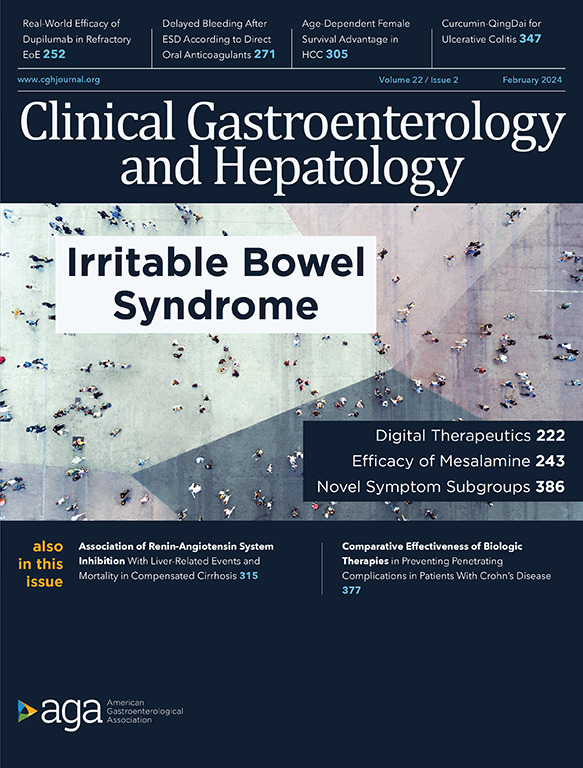前往治疗中心的旅行时间与小儿炎症性肠病的诊断延迟有关。
IF 11.6
1区 医学
Q1 GASTROENTEROLOGY & HEPATOLOGY
引用次数: 0
摘要
背景和目的:炎症性肠病(IBD)的延迟诊断会导致症状延长和长期预后恶化。我们试图评估种族、民族、疾病类型和社会因素是否与儿科 IBD 诊断延迟有关:我们对 2019-2022 年间在美国 22 个地点新确诊的儿科 IBD 患者进行了横断面研究。家长/监护人报告了种族、民族、症状发作与诊断之间的时间以及其他健康的社会决定因素。通过使用广义估计方程进行双变量和多变量分析,我们评估了这些因素与诊断时间(定义为≤60天、61-180天、181-365天和>365天)之间的关联:我们招募了 869 名参与者(诊断时平均年龄为 13.1 岁,52% 为男性,57% 为克罗恩病 (CD),34% 为溃疡性结肠炎 (UC),8% 为西班牙裔,30% 为非白人)。总体而言,平均诊断时间为 265.9 天。经调整后,与诊断时间延长相关的因素包括:CD vs. UC(OR 2.6,95% CI 1.9-3.5)、2 种或更多其他健康状况(OR 1.7,95% CI 1.1-2.7)以及前往诊所的旅行时间较长[(> 1 小时(OR 1.7,95% CI 1.2-2.4),> 2 小时(OR 1.8,95% CI 1.2-2.9))]:与之前的文献一致,CD 的诊断延迟时间长于 UC。令人欣慰的是,不同种族群体的诊断时间是公平的。受旅行时间较长影响的社区需要新的诊断护理模式。本文章由计算机程序翻译,如有差异,请以英文原文为准。
Travel Time to Treating Center Is Associated With Diagnostic Delay in Pediatric Inflammatory Bowel Disease
Background & Aims
Delayed diagnosis of inflammatory bowel disease (IBD) leads to prolonged symptoms and worse long-term outcomes. We sought to evaluate whether race, ethnicity, disease type, and social factors are associated with delayed diagnosis of pediatric IBD.
Methods
We performed a cross-sectional study of newly diagnosed pediatric patients with IBD at 22 United States sites from 2019 to 2022. Parents/guardians reported race, ethnicity, time between symptom onset and diagnosis, and other social determinants of health. Through bivariate and multivariable analyses using generalized estimating equations, we evaluated associations between these factors and diagnosis time defined as ≤60 days, 61 to 180 days, 181 to 365 days, and >365 days.
Results
We enrolled 869 participants (mean age at diagnosis, 13.1 years; 52% male; 57% Crohn’s disease [CD]; 34% ulcerative colitis [UC]; 8% Hispanic; 30% non-White). Overall, the mean time to diagnosis was 265.9 days. After adjustment, factors associated with longer diagnosis time included CD vs UC (odds ratio [OR], 2.6; 95% confidence interval [CI], 1.9–3.5), 2 or more other health conditions (OR, 1.7; 95% CI, 1.1–2.7), and longer travel time to clinic (>1 hour [OR, 1.7; 95% CI, 1.2–2.4], >2 hours (OR, 1.8; 95% CI, 1.2–2.9] each vs <30 minutes). There was no association with race, ethnicity, birth country, gender, parent education, household income, insurance type, health literacy, and health system distrust.
Conclusions
Consistent with prior literature, diagnostic delay is longer for CD than UC. Reassuringly, time to diagnosis is equitable across racioethnic groups. New models of diagnostic care are needed for communities affected by longer travel times.
求助全文
通过发布文献求助,成功后即可免费获取论文全文。
去求助
来源期刊
CiteScore
16.90
自引率
4.80%
发文量
903
审稿时长
22 days
期刊介绍:
Clinical Gastroenterology and Hepatology (CGH) is dedicated to offering readers a comprehensive exploration of themes in clinical gastroenterology and hepatology. Encompassing diagnostic, endoscopic, interventional, and therapeutic advances, the journal covers areas such as cancer, inflammatory diseases, functional gastrointestinal disorders, nutrition, absorption, and secretion.
As a peer-reviewed publication, CGH features original articles and scholarly reviews, ensuring immediate relevance to the practice of gastroenterology and hepatology. Beyond peer-reviewed content, the journal includes invited key reviews and articles on endoscopy/practice-based technology, health-care policy, and practice management. Multimedia elements, including images, video abstracts, and podcasts, enhance the reader's experience. CGH remains actively engaged with its audience through updates and commentary shared via platforms such as Facebook and Twitter.

 求助内容:
求助内容: 应助结果提醒方式:
应助结果提醒方式:


